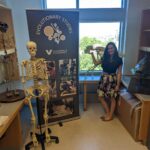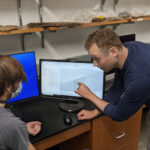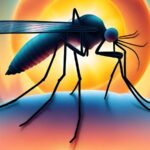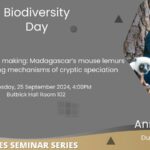Uncategorized
Annie Hatmaker Explores the Global Diversity of a Pathogenic Fungus
Aug. 18, 2025—By Andy Flick, Evolutionary Studies scientific coordinator Annie Hatmaker, Ph.D., has spent the better part of a decade studying fungi and their secondary metabolites – small molecules they use to communicate, defend, and thrive. Her new publication, “Population structure in a fungal human pathogen is potentially linked to pathogenicity,” closes her dissertation work and opens...
Ancient Bones, Modern Insights: Investigating Mercury Exposure in Colonial Peru
Nov. 11, 2024—By: Alexandria Leeper, Evolutionary Studies graduate communications assistant Sylvia Cheever, a Ph.D. student in Biological Anthropology at Vanderbilt University, is uncovering the hidden stories of indigenous communities affected by colonial exploitation in Peru. Supported by a pilot grant from the Vanderbilt Evolutionary Studies Initiative, Cheever’s research focuses on measuring mercury levels in ancient human bones...
Vanderbilt Alumnus Uncovers Feeding Strategies of Ancient Ediacaran Organisms
Oct. 22, 2024—By: Andy Flick, Evolutionary Studies scientific coordinator A new study, led by alumnus Andrei Olaru in Paleobiology titled, “Functional morphology of the Ediacaran organism Tribrachidium heraldicum” sheds light on the functional morphology one of the earliest known large and complex animals. Using advanced computational fluid dynamics (CFD), the research explores how this 550-million-year-old organism, characterized...
Ken Catania to Present Evolution-focused, Spooky Halloween Talk
Oct. 1, 2024—By Danielle Bowden, Evolutionary Studies administrative specialist Nashville, TN –– Vanderbilt University’s Evolutionary Studies Initiative is thrilled to announce that distinguished evolutionary biologist Kenneth Catania will be delivering the Halloween Spooktacular Lecture as part of the ESI seminar series. Catania is a professor of Biological Sciences at Vanderbilt University. The lecture, titled “Science Lessons from...
Mitochondrial DNA Evolution: New Study Reveals How Selfish mtDNA Evolve and Thrive
Sep. 20, 2024—By Andy Flick, Evolutionary Studies scientific coordinator Vanderbilt University researchers, led by alumnus Bryan Gitschlag, have uncovered groundbreaking insights into the evolution of mitochondrial DNA (mtDNA). In their paper in Nature Communications titled “Multiple distinct evolutionary mechanisms govern the dynamics of selfish mitochondrial genomes in Caenorhabditis elegans,” the team reveals how selfish mtDNA, which can...
Evolved in the Lab, Found in Nature: Uncovering Hidden pH Sensing Abilities
Sep. 20, 2024—By Andy Flick, Evolutionary Studies scientific coordinator In a groundbreaking study led by Sarah Worthan, Ph.D., a postdoctoral researcher in the Behringer Lab at Vanderbilt University, scientists have successfully evolved microbial cultures that possess the ability to sense pH changes, enabling rapid responses to environmental fluctuations. Along with highlighting the power of lab-driven evolution, this...
Vanderbilt Researchers Find Warming Quickens Aging-Related Mortality in Mosquitoes
Sep. 19, 2024—By Andy Flick, Evolutionary Studies scientific coordinator Mosquitoes tread a thinning line in warming climates, where aging accelerates and infections intensify. New research shows that warming and aging act as a one-two punch, lowering mosquito lifespans and fanning the flames of bacterial infections. These findings highlight how climate change could alter the risks of disease...
Distinguished Evolutionary Biologist Anne Yoder to Deliver Annual Biodiversity Day Lecture
Sep. 12, 2024—By Danielle Bowden, Evolutionary Studies administrative specialist Nashville, TN –– Vanderbilt University’s Evolutionary Studies Initiative is thrilled to announce that distinguished evolutionary biologist Anne Yoder will be delivering the annual Biodiversity Day Lecture. Yoder is widely recognized for her groundbreaking research on the genetics and speciation of Madagascar’s lemurs, which has transformed our understanding of...
Vanderbilt Anthropologist Explores How Different Childcare Models Affect Child Health in Working Families
Sep. 12, 2024—By Andy Flick, Evolutionary Studies scientific coordinator A new study co-authored by Monica Keith, Assistant Professor of Anthropology, provides insights into how different childcare models affect child health outcomes in working families. The research, focused on subsistence-based, semi-nomadic Shodagor communities in Bangladesh, highlights the crucial role of maternal care and effective substitutes in maintaining child...
Researchers Discover Wide Variation in Virulence of Non-Pathogenic Fungi
Sep. 11, 2024—By Andy Flick, Evolutionary Studies scientific coordinator A new study led by research assistant professor David Rinker sheds light on how fungal pathogenicity might evolve. The article, “Strain heterogeneity in a non-pathogenic Aspergillus fungus highlights factors associated with virulence,” was published in the journal Communications Biology in September 2024. According to Rinker, “different isolates or...









